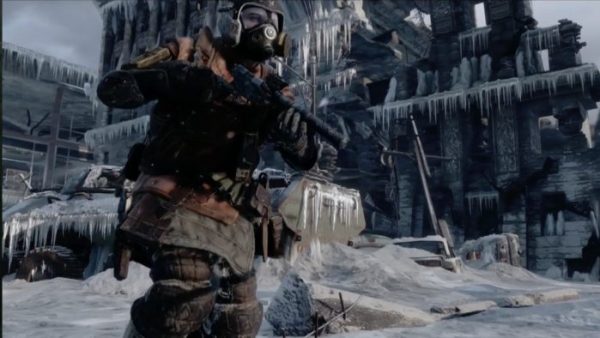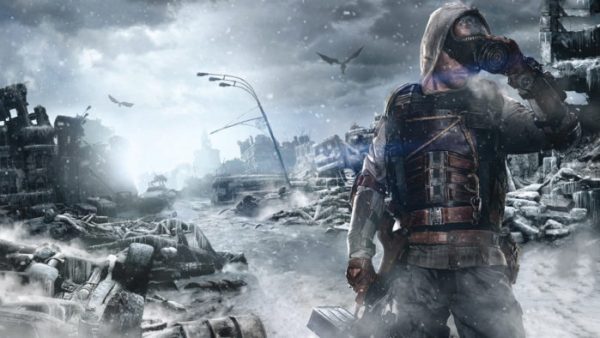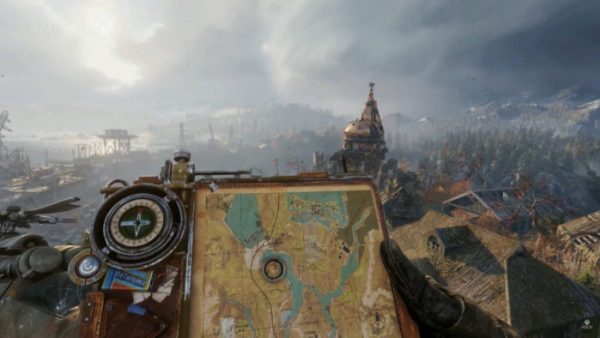It’s a Little Bit Metro, a Little Bit Stalker

4A Games is best known as the developer of the Metro series, but there’s another post-apocalyptic game franchise that the developer is behind, S.T.A.L.K.E.R. While there are similarities, the two franchises are quite different seeing as Metro had a focus on claustrophobic horror, while Stalker dropped into expansive open environments, letting you wander and explore as the horrors of Chernobyl stalked you.
Metro Exodus is a departure for the franchise, opting to move away from the tight corridors of the underground into a new massive environment on the surface. During our time with the demo, 4A said that most of the game will be split up between a few different open world areas, mixed with some linear levels. Now, this isn’t the kind of open world you might be thinking of, it’s not a continuous all-explorable landmass, but rather different sections akin to something like Dragon Age Inquisition. You do have various objectives to complete, but in our demo, the objectives took us all over the large snowy region called Volga we were exploring.
It seems like the story guides you to certain places, but there’s some degree of freedom in how you want to approach them, and what you want to see along the way. Because of this the world ends up feeling more like a Stalker game, but the element of very limited ammo forces you to explore it like a Metro game. Peppered around the area were little secrets and hideaways containing valuable ammo, crafting supplies, and weapons. Sadly there didn’t seem to be much in the way of interesting narrative pieces or side content to uncover, at least in the section we played, but this could easily not be true of the full game. Either way, the core tenets of the Metro series are there, but how you approach the story feels different.
Crafting Is a Nice Addition, But It’s Simple

Another new feature integrated into Metro Exodus is the ability to craft, and it’s absolutely essential to keeping yourself healed and well-stocked. However, it’s important to note that the system isn’t quite as complex as other games, as you’ll only need a few basic categories of materials to craft. You can pick up items throughout the world and stock up things like science materials, metal, and more. These basic categories are then used to craft a variety of tools including health packs, ammo for your pneumatic weapons, throwing knives, among others. By boiling down the materials into a few basic categories, Metro Exodus allows you to craft everything by simply finding materials instead of making you search high and low for something specific. Your backpack lets you stop at any time you want to craft items and change the attachments on your guns.
At the same time, you can craft more complex things at workbenches that you can find in a few buildings. There, you can make ammo for your other weapons, and attachments for your weapons. This time around each weapon can have up to five different attachments, drastically altering the way you aim and how the guns operate. If you were hoping for a deep and complex crafting system, Metro Exodus doesn’t have it. However, in the end I found myself appreciating the simplicity of it all, making it easier to craft those much-needed items but still adding that survival element in as I explored for scrap and had to prioritize which items I really needed most.
There’s Still a Deep, Personal Story

Story has always been one of the key pieces of Metro’s puzzle, and Exodus seems to be very much the same way. The demo we played started with the series’ traditional exposition, a personal paragraph written in Artyom’s voice. While it wasn’t clear how Exodus ties into the previous games, or if any of those supernatural elements might return, this is very much still Artyom’s story.
According to 4A Games the story content of Exodus is absolutely massive, and their representative told us, “Metro Exodus compared to the previous two titles has more dialogue lines than both of them combined. In terms of gameplay length, it’s more than double the length. And in terms of geographical footprint, it’s many many times bigger, as we’ve gone from one city to an entire continent.”
Going along with that huge undertaking, 4A’s headcount has doubled since they started development on Metro Exodus. Our hands-on time first had us investigating a settlement after our train, the Aurora, was attacked. It turns out the settlement was the site of a fanatical cult that tries to trap and kill Artyom, but at the last minute we were saved by a young girl and her mother, also held captive. Going from there we saved the girl and her mother, taking her to the Aurora, which in turn led to information and the mother using her medical skills to help the others in our group. Even though Metro Exodus takes place away from the dank underground tunnels, it’s still an apocalyptic world filled with dangerous creatures and bandits. It seems like the personal stories that took place in previous titles will still be very much present here.
It’s Not Just an Adaption of Metro 2035

If you didn’t happen to know, the Metro series is based off of a series of sci-fi novels of the same name by Dmitry Glukhovsky. Metro 2033 was based, of course, on Metro 2033, while Last Light was based on Metro 2034. This time around, Metro Exodus isn’t just an adaption of Metro 2035, but it’s a story that kind of interweaves with the novel, according to 4A Games.
“With Exodus, 4A wanted to try something new. Working once more with Dmitry Glukhovsky, they’ve written a story that stars Artyom leading a small group of spartans out of the ruins of Moscow,” said a representative of 4A Games. While the other games certainly had their own elements of creative liberties, it seems like Exodus started its life as an idea from 4A Games, but Glukhovsky has helped write the actual narrative. This means that fans of the series can expect something entirely new, that plays off of and could potentially even tie into the latest novel.
Immersion and Tension Still Take Center Stage

Metro has always been about immersing players into its world, taking little steps to sink you into things even more. This manifests in things like pulling out a clipboard to look at your map, seeing the radiation levels in the gauge on your arm, or having to wipe mud and dirt off of your gas mask visor to clear your view. These little details and cues are only expanded upon in Exodus, with details like the light on your watch illuminating when enemies can see you.
Tension is another key factor of Metro’s experience, and the survival horror franchise has consistently done a good job of providing a creepy atmosphere. Even though our demo of Exodus was in a gorgeous open snowfield, this tension still permeated everything. One particular moment had me surrounded by watchers, mutated wolf-like creatures, who can move quickly and easily circle around you. While I moved through the field howls from the creatures kept popping up, but I couldn’t see where they were until they were upon me. Slowly I had to move across the field, constantly checking each direction and spinning around in the direction of the howl. This random moment built some extreme tension during my playtime, as the attacks from the last few watchers had already left me extremely low on ammo and health packs. The ammo shortage, in particular, plays a huge role in building tension as you want to be as lethal as possible, so as not to leave yourself with only a couple bullets when you need a full magazine.
As a final thought, Metro Exodus definitely has a ways to go, as the build we were shown was clearly early and filled with bugs, awkward animations, and placeholder voice acting. Still, what we played was definitely promising and if the polish can can get layered on top of these ideas, Exodus could be a bold new direction for the Metro series.
